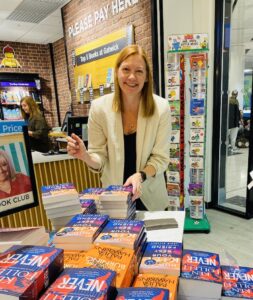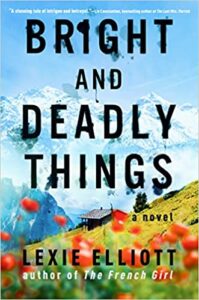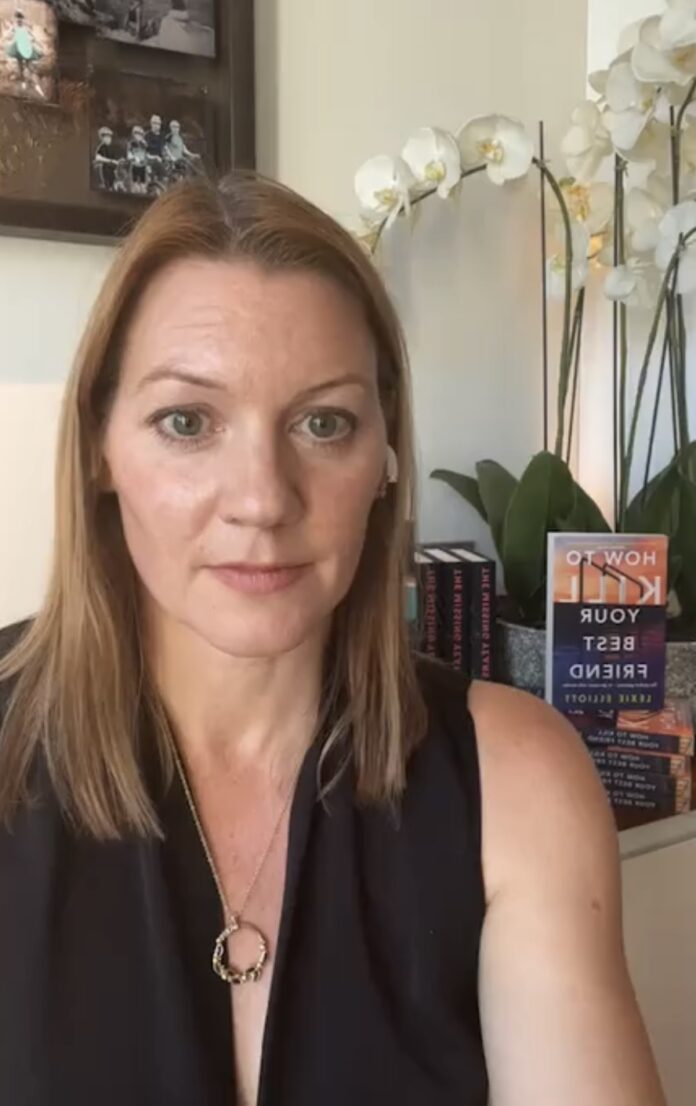Today, we welcome, Lexie Elliott! She is the author of the newly released psychological thriller BRIGHT AND DEADLY THINGS. We’re excited to have you on Reader’s Entertainment. First, tell our readers a bit about yourself.
Hello! My name is Lexie Elliott, and I’m the author of four psychological thrillers, the most recent of which is Bright and Deadly Things, which will be published on February 14. I grew up in Scotland, at the foot of the Highlands, and then spent seven years at Oxford University, gaining a master’s degree in physics followed by a doctorate in theoretical physics. After that I moved to London and worked in finance, first for an investment bank and later for an asset management company, before becoming a fulltime writer in 2021. I live in southwest London with my husband, our two sons and a truly extraordinary amount of sports kit.
How long have you been writing and it is your full time job? If not, what is your ‘real world’ job?
I’ve been writing for as long as I can remember; as soon as I could put pencil to paper, I created stories (usually about horses at that stage!) and took them into my primary school teacher. But I first started attempting to write a novel in 2009, when, like many in the financial industry, I lost my job in the Global Financial Crisis. I had two very young children at the time, so it took me an embarrassingly long time to write the thing, and almost as long to get an agent and then a publisher, but eventually The French Girl was published in 2018. By then I was working in the city again, in real estate debt finance, but I was lucky enough to have a 3-day position; for a few years I juggled the job and the writing and family life—but in 2021, I became a fulltime writer (though I still occasionally do bits of consultancy work in the financial industry).
Tell readers what your typical writing day looks like?
I usually start the day with some exercise (swimming, running or strength training), and then I tend to tick off any admin or chores that need to be done; as a result, I often don’t sit down to write until 11am or even later. I like to get all of that other stuff done first because once I start to write, it can be difficult to pull myself out of that world. I usually write either at home or in the café of my local leisure club, but really I can write anywhere; when the kids were smaller I did a lot of tapping away poolside whilst they charged up and down in their training sessions, or in the car waiting for them to emerge from athletics training. How late into the evening I write depends on what else is happening that day and how happy I am with what I’ve achieved. At the beginning of a project, I have daily wordcount targets to keep me going, but towards the end those become unnecessary, as the words flow out much more easily in the latter stages.
Tell us about your latest release?
Bright and Deadly Things is set in a rustic chalet in the French Alps, where recently-widowed Oxford don Emily is spending a week with a collection of friends from the university as well as well as other fellows, graduates, and undergraduates. With no electricity, running water, or access by car, this seems like the perfect place for her to begin cutting through the fog of her grief. But before even making it to the airport, she’s unnerved by a break-in at her home. Once at the chalet, tension amongst the guests is palpable. Her friends and colleagues are behaving oddly, and competition for a newly opened position has introduced a streak of meanness into the otherwise relaxing getaway. As hostilities grow and the discordant bell of the curious grandfather clock in the salon begins to invade everyone’s dreams, Emily starts to wonder if the chalet’s dark history has cast a shadow over the retreat. When a student disappears, Emily realizes that she’d better separate friend from foe, and real from imagined—or the next disappearance may be her own.
What inspired the idea for this book?
The Chalet des Anglais does in fact exist and in the year 2000, when I was working on my doctorate, I was lucky enough to receive an invitation to join an academic party there; the chalet is owned by three Oxford colleges, and each of them holds invitation-only reading parties during the summer. I had an utterly lovely time, and nobody died, but the unique experience stuck in my mind. The chalet in my novel is not exactly the same as the real one, both because I tweaked certain features to better suit the story and because, after two decades or so, my memories of it are imperfect (the covid pandemic precluded any research trips to refresh those memories). When I began mulling over setting a novel in the world of academia, the chalet floated back into my mind, and it seemed like the perfect setting in which to put a different twist on the “campus thriller” genre.
- Which of the characters do you relate to the most and why?
Interesting question! I would say I relate to all of them, in different ways. To write authentic character arcs, you need to understand what drives those characters, and whilst some of them make choices I really, really hope I wouldn’t, I can at least understand how they got there.
Would you and your main character be friends?
Yes! I would absolutely be friends with Emily, as soon as I’d broken through her natural reserve; she is smart and loyal and resourceful, and I would love to have her in my camp.
What part of the book was the hardest to write?
There are some short diary entries sprinkled throughout the book, which are penned by characters other than the main narrator Emily. My third novel, How To Kill Your Best Friend, had a dual narrative but I hadn’t ever had to manage more voices than that before; I really had to work very hard to make sure each entry sounded distinct, and to make sure each entry also pushed the story along. I’m pleased by the way it ultimately turned out, but it did require quite a lot of thought.
Did you model a character after someone you know?
No, not at all. I can think of one occasion where I’ve done that for the appearance of a minor character, but not for their personality — or at least, not consciously. My characters tend to present themselves to me fully formed; I don’t make need to make deliberate decisions on how to “build” them.
If you’re planning a sequel, can you share a tiny bit about your plans for it?
No sequel! All of my novels have been stand-alone thrillers.
Are there any particular authors that have influenced how you write and, if so, how have they influenced you?
As a teenager, I read a lot of mysteries (from a variety of authors, including Agatha Christie, Dick Francis and M. M. Kaye amongst others) from which I gained a real appreciation for a well-structured thrilling tale; a lot of fantasy (Sheri S. Tepper, Robin McKinley and Anne McCaffrey were my absolute favourites) which taught me about the importance of setting and strong, authentic characterisation; and a lot of Margaret Atwood, whose work demonstrates pretty much everything a writer could ever need to know. But at some point, you really just have to find your own voice and trust that you already have the skillset and the intuition within you.
Any writing rituals?
Not really, unless you count chain-drinking cups of tea!
What’s your favorite under-appreciated novel?
Can I have two? One is Plainsong by Kent Haruf. It is so delicate and beautiful, with such spare but heartfelt language, that I really don’t think I could be friends with anyone that read it without falling in love with it. The other is Grass by Sheri S. Tepper. It’s such a tour de force: her world-building is extraordinary and her characterisation is also second-to-none, and on top of that, the concept is so fresh yet meticulously planned; the result is simply the most immersive novel you could ever hope to read.
Do you have a secret talent readers would be surprised by?
I swam the English Channel solo in 2007 in 12hours 31mins, but that might not surprise anyone who has read my third book (How To Kill Your Best Friend) as that novel has a swimming angle to it.
anyone who has read my third book (How To Kill Your Best Friend) as that novel has a swimming angle to it.
Your favorite go to drink or food when the world goes crazy!
How crazy are we talking?! Champagne is my party drink of choice. I also love a good chardonnay and the world doesn’t need to be very crazy for me to reach for that. But I simply cannot function without endless cups of English Breakfast tea, regardless of the state of the world.
And what is your writing Kryptonite?
Life. Ordinary life, and the messiness of it—all those little things that get thrown at you and derail you from actually sitting down to write. Now that I think about it, most of it stems from the children; I blame them entirely for the fact that I haven’t written at least a dozen novels by now. (I’m kidding. Mostly.)
Here’s a look at BRIGHT AND DEADLY THINGS:
 A remote back-to-basics mountaintop retreat in the French Alps turns deadly as an Oxford fellow finds herself in the crosshairs of her late husband’s dangerous secrets.
A remote back-to-basics mountaintop retreat in the French Alps turns deadly as an Oxford fellow finds herself in the crosshairs of her late husband’s dangerous secrets.
The Chalet des Anglais should be the ideal locale for recently-widowed Oxford don Emily to begin cutting through the fog of her grief. With no electricity, running water, or access by car, the rustic chalet nestled at the foot of the verdant, snow-topped Alps should afford Emily both time and space to heal. Joining her will be a collection of friends from the university, as well as other fellows, graduates, and undergraduates.
Something feels off, though—heightening Emily’s existing grief-induced anxiety. Before even making it to the airport, she’s unnerved by a break-in at her home. Once at the chalet, tension amongst the guests is palpable. Her friends and colleagues are behaving oddly, and competition for a newly opened position has introduced a streak of meanness into the otherwise relaxing getaway. As hostilities grow, Emily begins to wonder if the chalet’s dark history has cast a shadow over the retreat. In the salon, a curious grandfather clock looms, the only piece of furniture to survive a deadly blaze a century ago. As its discordant bell begins to invade everyone’s dreams, someone very real has been searching through Emily’s things and attempting to hack into her computer.
When a student disappears, Emily realizes that she’d better separate friend from foe, and real from imagined—or the next disappearance may be her own.






